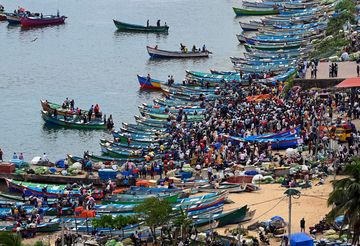The oceans are the lifeblood of our planet, covering over 70 per cent of its surface and providing a critical source of sustenance and economic activity. They support the livelihoods of billions, regulate our climate, and drive global trade. However, these vital ecosystems are under severe threat from pollution, overfishing, and climate change. As we face these challenges, it is essential to adopt sustainable practices and seek international cooperation to preserve the oceans for future generations.
Oceans are essential for earth’s ecological balance, absorbing 30 per cent of greenhouse gas emissions and producing oxygen through marine photosynthesis. They are a key driver of the global economy, with ocean-related industries generating trillions annually, and facilitating 80 per cent of global trade via sea routes. Coastal areas are also home to more than 40 per cent of the global population, and offer numerous recreational and tourism opportunities. Despite their importance, the health of our oceans is rapidly declining. Pollution, illegal, unreported, and unregulated fishing, and climate change are the primary threats. Marine pollution, including plastic waste, oil spills, and toxic chemicals, is devastating marine life and ecosystems. Overfishing is depleting fish stocks and endangering species, while climate change is causing ocean acidification, rising sea levels, and increasing sea temperatures.
The challenges confronting oceans disproportionately impact developing nations and small island states heavily reliant on marine resources for economic stability and food security. Their limited economic diversification renders them vulnerable to disruptions in fisheries and tourism, compounded by the brunt of climate change impacts, including rising sea levels, coastal erosion, and severe weather events. Limited financial and technical resources exacerbate their vulnerability, impeding efforts to invest in sustainable practices and disaster resilience. The ocean does not adhere to manmade borders, making its preservation a collective responsibility that requires global cooperation to solve. India is at the forefront of implementing a Blue Economic Policy, aimed at effectively utilising maritime resources for sustainable coastal development. This comprehensive approach covers various sectors such as living and non-living resources, tourism, and ocean energy. Additionally, India’s Deep Ocean Mission focuses on six key areas to support these initiatives. Since 2015, India’s Security and Growth for All in the Region (SAGAR) policy highlights its commitment to fostering economic and security cooperation with maritime neighbours, emphasising the importance of global partnerships and maritime security capabilities. Yet, there is more we can do to save our oceans, especially as environmental conditions worsen.
India’s coastline holds vast potential for sustainable tourism, driving economic growth and fostering environmental stewardship. Essential to this endeavour is the protection of coral reefs and prevention of plastic and other pollution to attract tourists while safeguarding marine ecosystems. Strategic investments in tourism infrastructure, supported by both government and private sectors, along with community capacity building, are key to unlocking the sector’s full potential. During my tenure as Kerala tourism secretary, I witnessed firsthand how integrating coastal ecology with local culture can transform communities. By building capacity, utilising real-time data, and collaborating with multiple stakeholders, we improved the livelihoods of traditional fishermen, ensuring fair returns for their daily catch and an increased sense of duty towards shared sources of livelihood. By designating conservation areas and establishing marine protected zones, we can mitigate climate change effects. Collaborating with scientific institutions and local communities will ensure successful conservation and resource management. In tandem, India has the opportunity to harness renewable energy from the ocean, reducing dependency on fossil fuels. Investments in offshore wind, tidal, and wave energy research and development can foster innovation, contribute to a cleaner energy future, and enhance energy security.
India is ready to collaborate with other nations to advance a sustainable blue economy, leveraging platforms like the G20 for cooperation, knowledge sharing, and capacity building. The G20 nations must commit to safeguarding 30 per cent of the oceanic expanse by 2030, not only by establishing marine protected areas but also by ensuring sustainable management practices across all waters. It is time for action, with influential nations leading the charge towards a sustainable blue economy.
Author is G20 Sherpa. He is ex-CEO, NITI Aayog.


